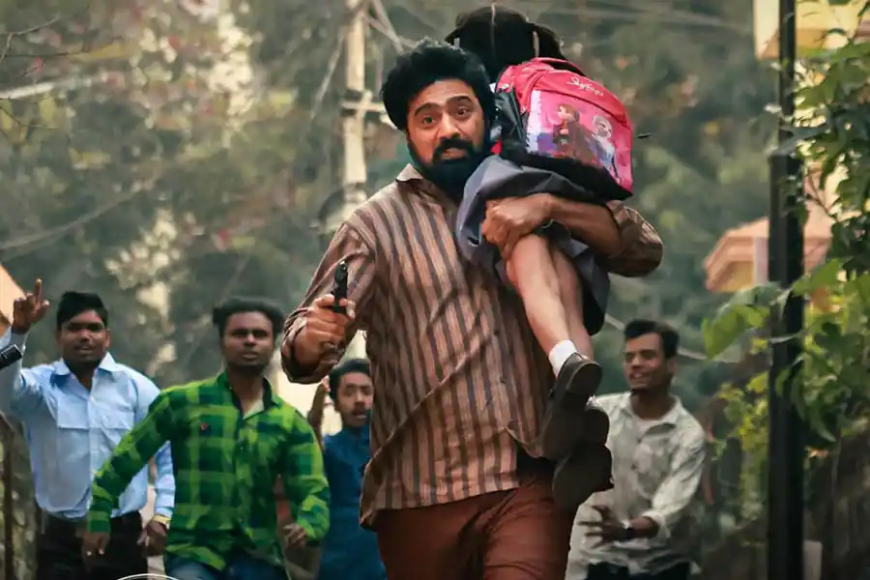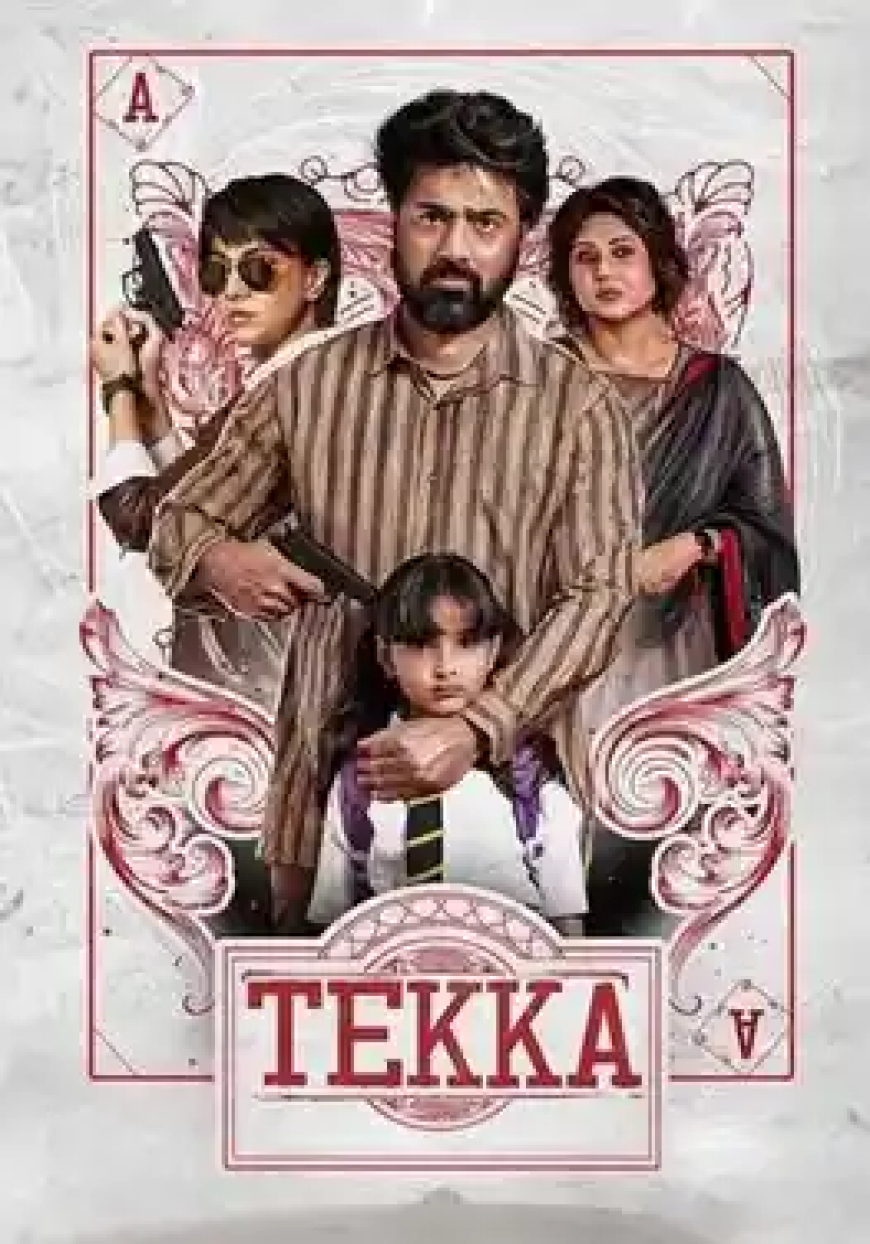TEKKA : A Thriller with a defeating twist
Shoma A. Chatterji provides a detailed review of the film TEKKA directed by SRIJIT MUKHERJEE with DEV, SWASTIKA and RUKMINI MAITRA doing the honours.
Srijit Mukherjee, a prolific filmmaker on the top rung on the success ladder of contemporary Bengali cinema, has the unusual talent of picking up plots from foreign films and twisting them beyond recognition to give them a completely Indian/Bengali identity. I have no problems because every creative writer/director has the creative right to get ‘inspired’ from a different creative source be it a story, a film, a play, a work of art, or, a combination of all these. Tekka is no exception though the credit for the story solely belongs to its writer Bhaskar Chatterjee, a Canada-based Indian who quit film journalism to write thrillers which have won him a promising space in the film industry. Tekka marks his debut as a writer in Bengali films. Chatterjee also wrote the dialogues translated into Bengali by Srijit.
Tekka is “inspired” by the 1997 Costa-Gavras English language thriller Mad City with necessary changes in the original story to make is more attractive to the Bengali mainstream audience. The title “Tekka” is the Bengali word for the “ace” in a set of cards, the winning card in most challenging card games.
Costa Gavras, now 91, is a Greek-French film director, screenwriter, and producer who lives and works in France. His film Z (1969) was a nail-biting, spine-chilling political thriller which laid the foundation for his next political thriller Missing (1982) and Hanna K (1983) all of which were fictionalised celluloid dramas based on real-life political events and characters.
Mad City was different because it did not have a political backdrop. Tekka too, is scripted so differently that unless you are an avid cinema buff, you will not notice the similarities between Mad City and Tekka. Tekka is a thriller based on the kidnapping of a little girl by Iqlakh (Dev), a security guard in a posh office in Kolkata. He organizes the kidnap of the little girl not for making any financial capital out of it but to avenge his dismissal by his employer for what, he thinks, is an exaggerated reaction to his misbehaving with two top executives of the same office and also as the only way he can demand that his job is given back to him. The two executives who insulted him with communally insulting remarks are never brought into the picture again. Iqlakh kidnaps a little girl when she is coming back from school and carries the girl to a high floor in the same office where he used to work, holding her hostage.
His demand is strange. He wants his job back failing which he will shoot the little girl down. But he is not a professional killer. Nor is he a kdinapper. So, we discover that Iqlakh is more scared than the ACP Maya Khastogir (Rukmini Maitra) who already has a record of negotiating a similar case of kidnap in Paris and is given the necessary police backup and authority to negotiate directly with Iqlakh and persuade him to release the little girl on condition that she will help him get reinstated to his lost job.
Khastogir herself is in a fix as she has just undergone a complicated fertility test and is in pain. But she is determined to talk Iqlakh out of his obstinacy, to free the girl and restore her to her terribly distraught mother Ira (Swastika Mukherjee). Ira, who holds a high-posted job, gets to the edge of a nervous breakdown when she learns of the kidnap of her little daughter and blasts the police force for its inefficiency. Once Khastogir meets Iqlakh with his gun pointed at her, the entire film dramatically becomes a cat-and-mouse chase between Khastogir on the one hand and Iqlakh on the other with the little girl caught in the crossfire. However, the kidnapped child appears the least panic-stricken about her situation and this raises some significant questions on the logic of this lack of fear and her growing sense of comfort with her kidnapper.
Unwittingly trapped in this entire game is Brishti (Sreeja Dutta)a young television journalist with the dagger of dismissal dangling over her head and her photographer friend Tintin (Aryaan Bhowmick) who jump onto this wagon and begin live telecasting of the kidnap and the negotiations as the only way to save their skins/jobs. They stealthily follow the doings of Khastogir and Iqlakh with their camera and soon, the channel they work for gets directly televised hot news. Added to this, is the gun-toting Ira who manages to climb to the floor where the kidnapper and her daughter are hiding and demands to speak to her daughter.
The kidnap drama takes a scary twist when Ira turns up with Iqlakh’s little son Guddu and threatens to shoot him down unless Iqlakh lets her daughter go. Iqlakh turns crazy with fear and anger. Seing everything slipping out of control, the police commissioner (Kamaleshwar Mukherjee) takes Khastogir off the case and promises to send shoot-at-sight backups to resolve the situation. But Khastogir is in no mood to let go.
Iqlakh, despite his terribly angry demeanour, is strangely kind towards the little girl who finds in him, comfort enough to go to sleep or to relish slush and pizza, or, to focus on her drawing book to be too panic-stricken in the hole she is trapped in. She is a hostage after all but she rarely behaves like one. You get to know why when the film ends.
Iqlakh, not satisfied with his boss’ assurance, wants his job back from the owner of the firm, Anubrata Adhikari (Paran Bandopadhyay). But the aged owner, who is about to fight the elections, refuses to agree, afraid to face a kidnapper with a gun pointed at him. He is busier adjusting his wig which constantly threatens to fall off. It finally does when caught between and among Iqlakh, Khastogir, Ira and the two young panic-stricken journalists, a cross-firing ensues.
What really saves the film are the sterling performances of Dev as Iqlakh, Rukmini Maitra as Khastogir and Swastika Mukherjee as Ira, the frightened mother of the little girl who threatens to shoot down Iqlakh’s motherless son. Dev is wonderful as a kidnapper who is more scared than the police out to nab him and brings across the image of an ordinary man trapped in an extra-ordinary situation he created himself without foreseeing the consequences.
Rukmini Maitra almost always has roles that are strong and assertive. Despite the look designed to make her appear less beautiful than she is, she does more than justice to the stubborn cop, disregarding her worried husband’s (Tota Roychoudhury) fear for her state of health. With the new look of short haircut and jeans and jacket she quite convincingly tries to console both the harried mother and the scared kidnapper, not letting them know that she is scared herself of what is going to happen next. And about her own state of health.
Mad City was by no chance, a “police procedural” because in this film, the tussle is between a sacked security guy (John Travolta) and a television journalist (Dustin Hoffman) who gets accidentally involved in the kidnap situation. But in Tekka, Maya Khastogir is like the other protagonist, desperately trying to negotiate with a kidnapper who is not quite a kidnapper and does not behave at all like a professional kidnapper. But she is a true-blooded cop and behaves like one. The scene in the washroom where she washes up her face and looks into the mirror is strikingly emotional and stays on in your mind.
Loknath Dey, appointed as Khastogir’s junior, is very good. The small scene in the fish market where we see him bargaining with some expensive brand of fish and cracking a joke with a junior offers a glimpse of his “honesty” as a cop. He is a classic example of the deeply flawed and morally compromised policeman of which we find other examples of the same at higher levels of office in the film.
It is the compromised “twist” that brings down the entire film with a thud to the bottom of the carefully constructed pyramid, turning what went on before into a melodrama . This reduces the police force including Khastogir to cartoon-like figures in an action thriller designed to entertain. The rationale offered to justify the “twist” does not work because it throws up everyone – Iqlakh, Ira, Khastogir, in poor light.
Kabir Suman’s iconic song Theme Jete Jete is beautifully positioned and invests the contemporary film with a touch of emotional nostalgia. DOP Madhura Palit has done a wonderful job, capturing challenging sequences within an empty office with two youngsters hiding to capture rare moments live on camera, Ira with the little boy wrapped in her arms and her gun pointed at his head, Khastogir often bending down in pain and Iqlakh caught in a situation he does not know either to handle or to come out of. The slash-and-jet-paced editing adds to the drama. Tekka comes to an end without answering any of the questions it raised throughout the film. Who comes out with the ace (Tekka) finally? No one knows. Sad, isn’t it?
*****
What's Your Reaction?


































































